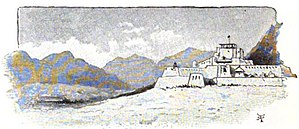Battle of Jamrud (1837)
| Battle of Jamrud | |||||||
|---|---|---|---|---|---|---|---|
| Part of the Afghan-Sikh wars | |||||||
 A portrait of the Jamrud Fort |
|||||||
|
|||||||
| Belligerents | |||||||
|
|
|
||||||
| Commanders and leaders | |||||||
|
Akbar Khan Afzal Khan |
Hari Singh Nalwa † Mahan Singh Mirpuri | ||||||
| Strength | |||||||
| 7,000 cavalry 2,000 matchlock 20,000 Khybers 50 pieces artillery |
800 Jamrud garrison 10,000 relief force/reinforcements |
||||||
The Battle of Jamrud was fought between the Emirate of Afghanistan and the Sikh Empire on 30 April 1837. The Sikhs were building up towards crossing the Khyber pass in order to invade Jalalabad. This led Afghan forces to confront the Sikh forces at Jamrud. The death of Sikh General Hari Singh Nalwa limited the Khyber pass as the western extent of the Sikh Empire. By the time Sikh reinforcements had arrived,The garrison army was able to hold the Afghans.After the battle, Amir Dost Muhammad took up the title of "Commander of the Faithful."
The Battle of Jamrud was fought between the Sikhs under Maharajah Ranjit Singh and the Afghans under Emir Dost Muhammad Khan. Since the consolidation of the Sikh Empire in Punjab, Maharajah Ranjit Singh had turned the wave of invasions on Afghanistan. The Afghans had been losing their long held territories to Sikhs over the preceding years due to internal conflicts, and had seen their once mighty empire shrink with the loss of the Punjab region, Multan, Kashmir, Derajat, Hazara and Peshawar.
Towards the end of 1836, Sardar Hari Singh Nalwa attacked and captured the small, though very strategic, fortified Misha Khel Khyberi village of Jamrud, situated on the south-side of a range of mountains at the mouth of the Khyber pass. With the conquest of Jamrud, the frontier of the Sikh Empire now bordered the frontier of Afghanistan.
In 1837, the Sikh army was in Lahore for the wedding of Kanwar Nau Nihal Singh, the grandson of Maharaja Ranjit Singh.The Emir of Afghanistan, Dost Muhammad Khan, accompanied by five of his sons, rushed with his army to drive the Sikhs out of Peshawar. The Sikh general Sardar Hari Singh Nalwa was killed in the battle. Many eyewitnesses claimed Nalwa ordered his under garments to be hung outside the fort before he died, discouraging the Afghans from attacking, believing Nalwa was still alive.
...
Wikipedia
